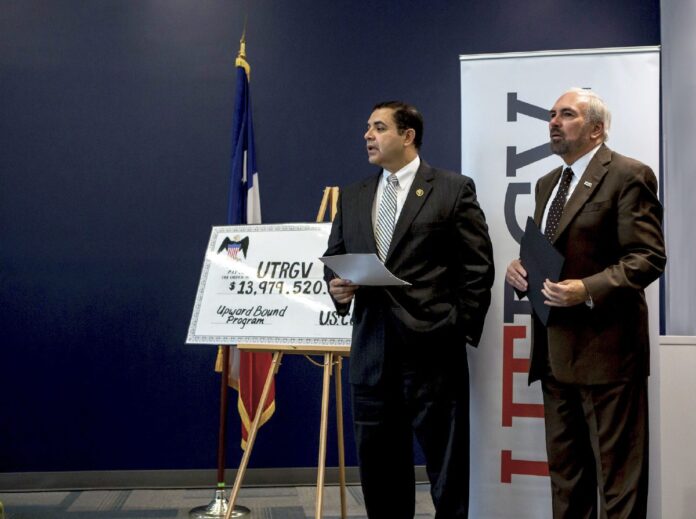MISSION — A federally-funded program that has been guiding and mentoring students on their way to college for 45 years was not only renewed this year, but received $13.9 million to also expand to more Rio Grande Valley communities over the next five years.
U.S. Rep. Henry Cuellar, D-Laredo, made the announcement of the awards Friday at the Mission CEED Building along with UTRGV officials and representatives from the offices of U.S. Sen. John Cornyn and U.S. Rep. Vicente Gonzalez, D-McAllen.
The funding came through Upward Bound grants from the U.S. Department of Education, which aims at helping low-income or first-generation high school students through the transition to college.
“We typically look for students that may not be on the traditional track toward college and help them get there,” said Sylvia Leal, associate vice president of student educational outreach. “More importantly academic preparation; what courses do you need, how do you access those courses, do you need tutoring support. … Our staff identifies these students and they work with them for the four years that they are in high school.”
The program, based out of the University of Texas Rio Grande Valley, is currently serving Edinburg, Edcouch-Elsa, La Joya and Brownsville, but instead of just renewing the four grants funding these areas, program officers and UTRGV officials applied for five extra grants to expand to underserved areas such as Willacy County, Port Isabel and Rio Grande City.
The grant will be broken down over five years with the university receiving the first grant of close to $2.8 million in September 2017. The money will be used to hire more staff to serve the new areas and begin recruiting students starting the fall, Leal said.
These staffers are the ones in charge of visiting schools and keeping track of the students throughout their entire high school career. Most students don’t have much of an idea of the process and need for early preparation.
“If they are freshmen, we start telling them they need the community service; we help them with resume writing; we start helping them build,” said Petra Lopez-Vaquera, program director. “Once they are juniors or seniors, we tell them what scholarships they need to apply for, the deadlines. They just have to do it.”
Even though the program is based out of the university, students are not only encouraged or exposed to UTRGV, but to any university of their choice. Some of the funds are also used to take participants on college visits.
“We are very excited that we can continue, because we are celebrating our 45th year with no break in service, which is rare,” Lopez-Vaquera said. “Expanding is awesome… because it’s sad when they tell us that they go to a different school and we can’t help them.”




